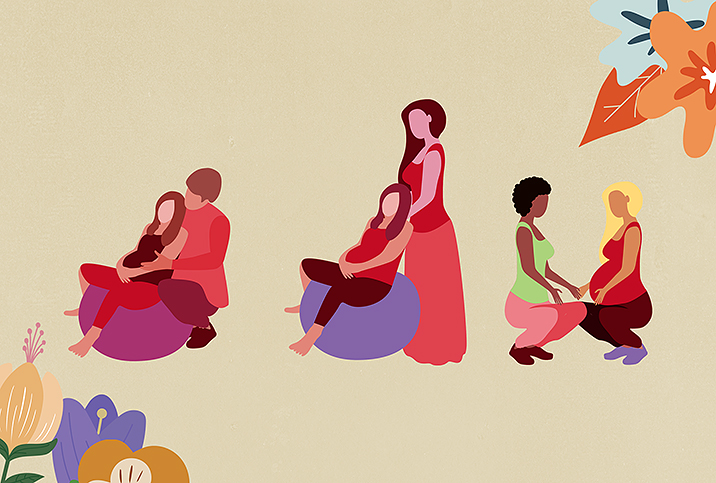What's the Difference Between an OB-GYN, a Midwife and a Doula?

Key Points
- OB-GYNs, midwives and doulas all play a role in caring for pregnant people, just in different ways.
- OB-GYNs are the most medically trained and offer the full scope of medical care. Doulas are not medical professionals.
- It's important to know the differences between all three in order to choose the right type of care for your pregnancy, birth and postpartum life.
One of the things to consider leading up to birth is your pregnancy care team. OB-GYNs, midwives and doulas are all care providers during pregnancy, birth and postpartum life, but they each have different qualifications and purposes.
Understanding the differences between these care providers can help you create the ideal team to care for you during pregnancy and into your parenthood journey.
What is an OB-GYN?
OB-GYN is an abbreviation for obstetrician-gynecologist. OB-GYNs are specialists trained in two areas of expertise, according to *Fatima Daoud, M.D., a board-certified OB-GYN and clinical assistant professor of obstetrics and gynecology at Stony Brook University in New York.
"Obstetrics is the care of women and babies during pregnancy and childbirth," Daoud said. "Gynecology is the treatment of conditions unique to the female reproductive tract."
In the United States, OB-GYNs are regulated by their state medical board and the American College of Obstetricians and Gynecologists (ACOG).
While midwives and doulas both offer various kinds of care during pregnancy, delivery and the postpartum period, OB-GYNs are the only of the three professions qualified to provide the full scope of women's healthcare, including low- and high-risk pregnancy care, vaginal delivery, C-section deliveries, and vacuum and forceps deliveries.
OB-GYNs perform emergency surgeries and routine surgeries, including hysterectomies, ectopic pregnancy surgery and ovarian cyst removal. Their services are usually covered by health insurance.
In the U.S., OB-GYNs must complete a four-year bachelor's degree, four years of medical school and four years of OB-GYN residency training. Even after these 12 years, some OB-GYNs complete another two to three years of training to specialize further, Daoud said, such as in women's cancers.
What is a midwife?
The American College of Nurse Midwives (ACNM) defines midwifery as "independent provision of care during pregnancy, childbirth, and the postpartum period; sexual and reproductive health; gynecologic health and family planning services, including preconception care."
Recommended
- When It's Time for an OB-GYN to Step In: Some people opt for a midwife during pregnancy, but some situations require extra assistance.
- What Happens When Your Doctor Can't Deliver Your Baby?: You may need to get used to the idea of having a different physician in your birthing room.
- Your Burning C-Section Questions Answered: Be more empowered in your decision if the doctor recommends a cesarean.
"Midwives are masters- or doctorally prepared advanced practice providers of person-centered healthcare," said Heather Findletar Hines, D.N.P., C.N.M., an associate professor of midwifery at the Stony Brook School of Nursing in New York and the owner of One Love Midwifery.
Midwives are trained medical providers who focus on caring for low- to medium-risk patients at all stages of life, but they are primarily known for their care during pregnancy, birth and the postpartum period.
While OB-GYNs manage high-risk patients and surgery, midwives care for low-risk patients, which make up about 85 percent of birthing individuals, Hines said.
Midwives aren't doctors and have limitations.
Midwives cannot perform certain deliveries, namely C-sections and, in some areas, vacuum or forceps deliveries, Daoud said.
Despite that, midwives can provide comprehensive care, including assessment, diagnosis and treatment of patients. Midwives can conduct physical examinations, prescribe medications, order and interpret tests, and order medical devices and equipment.
They can operate in at-home settings, hospitals, clinics, birth centers, private offices and via telehealth.
Depending on their state of practice, midwives may be registered nurses or not, but nationwide, all midwives take a national certification exam. Prior to that, they complete a bachelor's degree and study further for two to four years.
Midwives are highly regulated in the U.S., Hines said.
Apart from the national certification, state licensure is necessary in order to practice, and midwives are required to carry liability insurance in most places. Laws regarding their scope of care vary from state to state, however, and there is no 'national standard' for certified midwife or certified nurse-midwife care.
In some states, midwives must be supervised by an M.D. or a D.O., Hines said. Midwifery care is covered by health insurance, but reimbursement may not be equal to that of medical doctors, she said.
What is a birth doula?
"A birth doula is a nonmedical person who provides physical, mental, emotional and informational support through pregnancy, birth and postpartum," said Imani Williams, a certified birth doula, postpartum doula, lactation counselor and certified nurse assistant in Denver.
While not qualified to give medical advice or deliver babies, doulas provide service to women preparing for birth and parenthood.
"Because midwives and OBs are medical, they often have more qualifications than doulas do, but doulas are more focused on the nonmedical aspects of support," Williams said.
Doulas play a role in creating birth plans, preparing the nursery, packing for the hospital or birth center, and emotionally and mentally preparing their clients for labor and birth. They share information and support about infant care, recovery and mentally processing birth after it's over.
"Doulas do so much for their clients, as our only job is to be there for them," Williams said.
Doula services are not covered by health insurance, though Williams said many doulas are trying to get insurance companies to include doula care to make it more accessible.
The process for becoming a doula differs from that of midwives and OB-GYNs.
Doulas are not regulated in the U.S., but some hospitals do require doulas to be certified before they are allowed to attend births.
"The process to become a birth doula looks different for everyone," Williams said. "For myself, I took weeks of reading certain books around birth support, trauma, etcetera, a three-day long training, and finally a test to certify. For others, they may have longer training that includes having to attend a certain number of births."
What is the role of midwives and doulas in safe births?
The maternal mortality rate in the U.S. rose to 23.8 deaths per 100,000 live births in 2020, up from 20.1 the prior year, according to the Centers for Disease Control and Prevention (CDC). It was significantly higher for non-Hispanic Black women—2.9 times the rate of non-Hispanic white women. In real numbers, 754 women died of maternal causes in 2019; that rose to 861 in 2020.
"BIPOC [Black, Indigenous and People of Color] birthing people are dying in labor and birth," Hines said, adding that she believes every birthing person needs doula support during pregnancy, birth and the fourth trimester (following birth).
Doulas play a significant part in advocacy in a hospital setting, particularly for marginalized groups, Williams said.
Home births are on the rise, increasing by 13 percent from 2020 to 2021, according to a 2022 study done by the CDC. This makes the at-home side of midwifery and doula services even more relevant for safe care, but accessibility remains an issue.
"We also need more midwives and doulas in every community providing access to resources and equitable care," Hines said.
Collaboration between OB-GYNs, midwives and doulas
OB-GYNs, midwives, and doulas are all distinct pregnancy and childbirth care providers, each qualified differently and offering different services. Collaboration between them can make for a more positive pregnancy and birth experience.
"Sometimes, this means being on standby in case a patient of the midwives needs a higher level of care if a complication develops," Daoud said. "Other times, it means working closely with a doula to support a patient's wishes in difficult situations."
Though the dynamics of collaboration can sometimes be challenging, the priority should be the overall well-being and care of the patient, Williams said.
"When pregnancy care is viewed as a team effort rather than a competition, the patient wins," Daoud said.
*Fatima Daoud stressed that her views are her own and not that of her employer.


















